What is 1C:Enterprise?
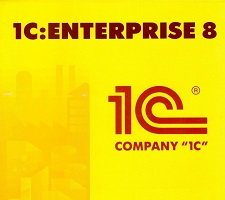
1C:Enterprise is a universal cloud and on-premise system of programs for automating a company’s financial and wider operational activities. 1C:Enterprise has the breadth of capability to address the diverse needs of today’s business. This is achieved through “configurability” – the ability to customize the system based on the specific needs of companies and their business processes.
1C:Enterprise is more than just a solution automating fixed business rules. Rather it is a suite of software tools employed by developers and users. The system can be logically divided into two major components that are closely interrelated: an application and the platform on which the application runs.
To explain the relationship between the system components of 1C:Enterprise, we compare it to a Blu-ray player. It is well known that a player is required for watching videos, listening to music, or playing other media content. The Blue-ray is standard but it meets the wide variety of customer needs through the range of discs out there with video or music to suit any taste.
To watch a video, you need to put a Blu-ray disc into a player, and the player will reproduce the content (video) that is recorded on it. In addition, Blu-ray players let you record your own content, i.e., create a new Blu-ray disc with a home video.
On its own, the player is useless without a Blu-ray disc, and likewise, a Blu-ray disc is useless without a player (except perhaps as a coaster for your coffee cup). Getting back to 1C:Enterprise, we can say that the platform is a type of “player”, and an application is a “disc”. The platform allows you to run the application, as well as modify it or create a new one. There is a single platform (1C:Enterprise 8), but an unlimited number of applications can be created. To run an application, you always need to have both the platform and the application itself (see the diagram above). The platform does not perform any automation tasks on its own, since its purpose is to provide the environment for developing and running applications. The same is also true for an application: it needs 1C:Enterprise Platform to run.
1C:Enterprise Platform offers the following advantages:
- Drastically reduces technological complexity, ergonomics, and performance issues of enterprise software systems.
- Allows power users to implement specific business processes.
- Speeds up and standardizes business application development, customization, and support.
- Provides complete openness of UI and solution code, which allows better understanding and modification of business processes.
- Is ready for integration with existing 1C applications and third-party systems.
- Supports web-services, ODBC, COM, and so on.
- Supports your preferred architecture: Windows/Linux, MS SQL, PostgreSQL, IBM DB2, and Oracle DB.
- Includes on-premise or managed hosting web-based delivery, as well as Web, tablet, or Windows client.
The 1C:Enterprise System of Programs
The 1C:Enterprise application system is daily used by several million users in business and government to automate operations, accounting, finance, HR, and management activities. 1C Company provides an array of vertical solutions for manufacturing, distribution, and service businesses. With its innovative technological platform and the array of applied solutions, 1C Company has achieved wide popularity for its openness, speed of modification and software updates. 1C:Enterprise is a very flexible and scalable platform meeting the needs of companies ranging in size from a single user to hundreds of users.
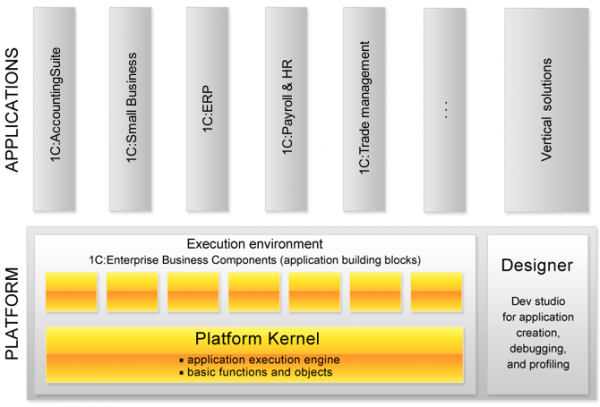
1C:Enterprise is a system of applications that includes the Platform and Applied Solutions (off-the-shelf applications).
The difference between the platform and the applied solutions is simple: the platform, as its name suggests, supports all of the applied solutions. The platform essentially stands alone, whereas there are many applied solutions. 1C Company and their partners are constantly introducing new applied solutions.
The benefit of having such a platform is to raise the abstract level of a software system. The platform handles all of the tasks related to technological complexity, performance, ergonomics, and so on.
1C:Enterprise allows you to do the following:
- Adapt the software system to match the specific language of users and experts in the subject area concerned.
- Speed up and standardize the development of applied solutions, as well as their implementation, customization, and maintenance.
- Allow customers to see all of the algorithms of the applied solution and change them, if necessary.
1C:Enterprise Platform consists of the following parts:
- Data/process layer that provides system features, such as support of a variety of databases, an application server, web server components, and web services components.
- Business Components – predefined visually configurable building blocks (templates) that are widely used in enterprise applications – catalogs, documents, accumulation registers, bookkeeping engine, calculation engine, and business process engine.
The above diagram of a business application shows usage examples for:
- Catalogs – storing lists of Customers, Products, and so on.
- Document – business events, such as Purchase Orders, Sales Orders, or Invoices.
- Accumulation register – accumulating document posting transactions, for example, accounts receivable or bank register.
- Accounting engine – accounting document posting – typically used for creating specialized ledgers, as well as the general ledger.
- Calculation engine – payroll calculations.
- Business process – used throughout the system.
Using the Business Components significantly reduces the cost of enterprise application development, since it allows the company to focus on implementation of its specific business processes only, instead of building basic business functionality from scratch.
The diagram below displays the overall 1C solution architecture consisting of the platform and the applications.
- The Platform – consists of the application server, Business Components (visually configurable building blocks), and IDE environment.
- Business applications running on the platform – 1C Company provides solutions for small and medium businesses – 1C:Accounting Suite; and for enterprise customers – ERP/MRP, HR, Logistics, Financial Consolidation, and so on. 1C Company and its partner network also offer vertical solutions for many industries.
The following table summarizes technologies and tools included in 1C:Enterprise.
Please see also:


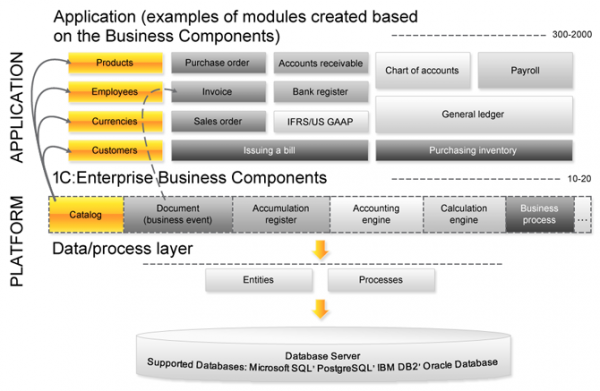
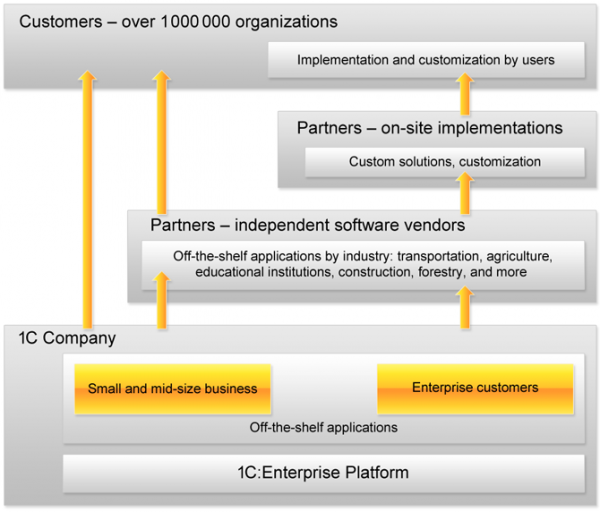
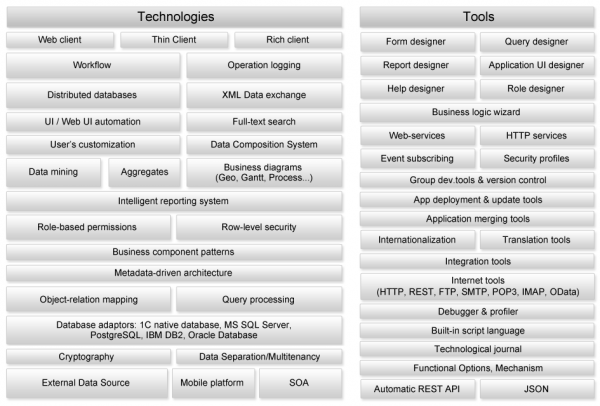
 Request more information here
Request more information here